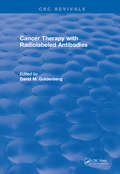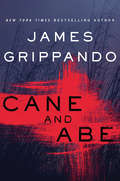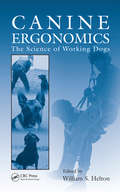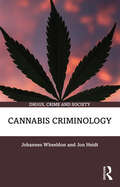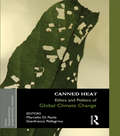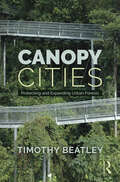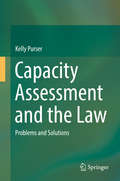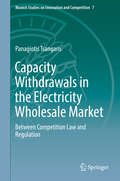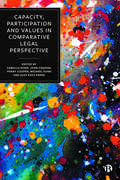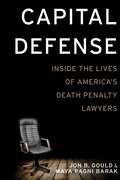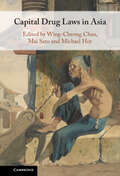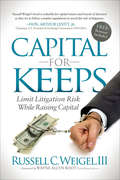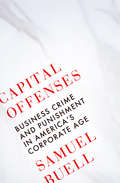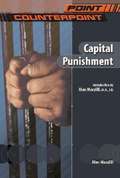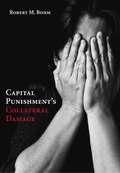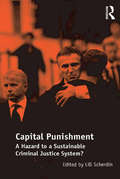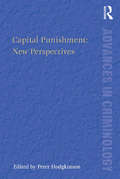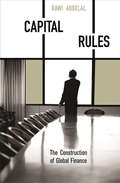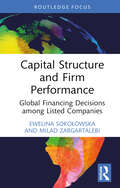- Table View
- List View
Cancer Therapy with Radiolabeled Antibodies
by David M. GoldenbergCancer Therapy with Radiolabeled Antibodies explores the most current experimental and clinical advances in the newly emerging field of cancer radioimmunotherapy (RAIT). Providing a multidisciplinary and international context, some of the world's leading experts examine the problems and prospects of RAIT from radiation, immunological, chemical, physical, physiological, and clinical perspectives with both overviews and original research.Discussions cover the up-to-date clinical results in the RAIT of ovarian, breast, colorectal, and brain cancers, as well as the current status of RAIT in the management of B cell lymphomas. Radiobiology, dosimetry, radiochemistry, targeting biology in experimental models, clinical experiences in hematopoietic and solid tumors, and new approaches to improve cancer radioimmunotherapy are also discussed. In addition, new dosimetry concepts, new labeling methods, new concepts of antibody pharmacokinetics, and new methods to enhance selective cancer radioimmunotherapy are included.
Cane and Abe
by James GrippandoIn this spellbinding new novel of suspense from New York Times bestselling author James Grippando, Miami's top prosecutor becomes a prime suspect in his wife's disappearance, which may have a chilling connection to the woman he can't forget.Unbelievable was the word for her. Samantha Vine was unbelievably beautiful. It was unbelievable that she'd married me. Even more unbelievable that she was gone. . . .Samantha died too soon. Abe Beckham's new wife has helped him through the loss, but some say it was a step back for Abe to marry Angelina, a love from his past. Abe doesn't want to hear it, and he's even managed to remain a star prosecutor at the Miami State Attorney's Office through his ups and downs.Then everything goes wrong. A woman's body is discovered dumped in the Everglades, and Abe is called upon to monitor the investigation. The FBI is tracking a killer in South Florida they call "Cutter" because his brutal methods hark back to Florida's dark past, when machete-wielding men cut sugarcane by hand in the blazing sun.When Angelina goes missing, the respected attorney finds himself under fire. Suspicion surrounds him. His closest friends, family, professional colleagues, and the media no longer trust his motives. Was Angelina right? Was their marriage not what they'd hoped for because he loved Samantha too much? Or was there another woman . . . and a husband with a dark side who simply wanted his new wife gone?
Canine Ergonomics: The Science of Working Dogs
by William S. HeltonSince Canis lupus familiaris first shared a fire with man more than 15,000 years ago, dogs have been trusted and valued coworkers. Yet the relatively new field of canine ergonomics is just beginning to unravel the secrets of this collaboration. As with many new fields, the literature on working dogs is scattered across several non-overlapping disci
Canine Olfaction Science and Law: Advances in Forensic Science, Medicine, Conservation, and Environmental Remediation
by Tadeusz Jezierski John Ensminger L. E. PapetThe value of the canine nose is well-documented, and working dogs are being utilized for their olfactory skills in an increasing number of fields. Not only are dogs used by police, security, and the military, but they are also now used in forensic science, in medical detection of disease, in calculating population trends of endangered species and e
Cannabis Criminology (Drugs, Crime and Society)
by Johannes Wheeldon Jon HeidtCannabis Criminology explores the prohibition, decriminalization, and liberalization of cannabis policy through the lens of criminological and sociological theory, essential concepts, and cannabis research. It does so by focusing on five thematic areas: law, society, and social control; police and policing; race, ethnicity, and criminalization; the economics of cannabis use; and cannabis use and crime. It is the first book on cannabis since President Joe Biden signed an executive order in 2022 to pardon citizens and lawful permanent residents convicted of simple cannabis possession under federal law and DC statute. Cannabis is now legal in some form in 37 US states. To understand the reform of cannabis policy and the challenges to come, we first need to understand the connections between cannabis and criminology. The book links key areas in past and contemporary cannabis research to criminological and sociological theories, including key concepts, emergent concerns, and new directions. Based on an up-to-date review of this growing area of research, the book outlines a research program based on five essential thematic areas. Introducing cannabis as a critical case study in moral-legal re-negotiation, it outlines how cannabis prohibition has influenced cannabis around the world. Five discrete chapters focus on thematic areas, criminological and sociological theories, define essential concepts, and provide research focused on law, society, and social control (Chapter 2), police and policing cannabis (Chapter 3), race, ethnicity, and criminalization (Chapter 4), the economics of cannabis (Chapter 5), and cannabis and crime (Chapter 6). The book concludes by presenting new ways to engage prohibitionist thinking, by challenging myths, embracing social media, and developing a duty of care to guide future cannabis researchers and explicitly involve people who use cannabis. Cannabis Criminology will be of interest to a variety of readers, including students and scholars from a range of backgrounds studying drug use, drug policy, cannabis legalization, and other drug-related issues. It will also appeal to policymakers who want to know more about cannabis legalization and drug prohibition, those working in the criminal justice system, and social work professionals. Due to its accessible style, people involved in the cannabis industry, as well as cannabis users may also find the book interesting.
Canned Heat: Ethics and Politics of Global Climate Change (Ethics, Human Rights and Global Political Thought #6)
by Marcello Di Paola Gianfranco PellegrinoClimate change is a key challenge in the contemporary world. This volume studies climate change through many lenses: politics, law, ethics, philosophy, religion, and contemporary art and culture. The essays explore alternatives for sustainable development and highlight oft-overlooked issues, such as climate change refugees and food justice. Designed as four parts, the volume: first, offers an astute diagnosis of the political and moral intricacies of climate change; second, deals specifically with topics in the political theory of climate change governance; third, focuses on the moral theory of climate change; and, finally, analyzes the specific ramifications of the climate change problem. With contributions from experts across the world, this will be especially useful to scholars and students of climate change studies, development studies, environmental studies, politics, and ethics and philosophy. It will also interest policy-makers, social activists, governmental and non-governmental agencies, and those in media and journalism.
Canon Law and the Letters of Ivo of Chartres
by Christof RolkerThe series Cambridge Studies in Medieval Life and Thought was inaugurated by G. G. Coulton in 1921; Professor Rosamond McKitterick now acts as General Editor of the Fourth Series, with Professor Christine Carpenter and Dr Jonathan Shapard as Advisory Editors. The series brings together outstanding work by medieval scholars over a wide range of human endeavour extending from political economy to the history of ideas. Book jacket.
Canopy Cities: Protecting and Expanding Urban Forests
by Timothy BeatleyThis book provides a comprehensive overview of the essential role of trees and forests in cities and examines the creative approaches cities around the world are taking to protect trees and expand their urban forests. Moving beyond the view that trees are luxuries and therefore non-essential to the life of a city, the book examines urban tree policies and approaches that foster tree protection, including tree codes and bylaws, and calls for greater community engagement to preserve this important facet of urban life. Through an international range of examples and case studies, featuring cities in the United States, Canada, Singapore, the Netherlands, Australia, France, New Zealand, Mexico, Sierra Leone, and the United Kingdom. The book offers best practice examples where trees have been further integrated into the fabric of urban planning and design, including forested towers, interior rainforests, tiny urban forests, and metropolitan forests. Written by a leading authority in the field, this is a fascinating read for researchers, students, and practitioners in urban planning, landscape architecture, and environmental policy and planning.
Capacity Assessment and the Law: Problems and Solutions
by Kelly PurserThis book discusses theoretical issues, standards, and professional considerations arising when legal and health practitioners undertake legal capacity assessments in the context of wills, enduring powers of attorney and advance health directives. The potential loss of cognition can erode autonomy as individuals lose the ability to make their own legally recognised decisions. This is an inescapable problem with significant legal, social, health and policy repercussions. This work synthesises and critically analyses the existing literature, including some of the best assessment models and guiding principles internationally, to generate a new methodology and understanding of what capacity assessment best practice means. This includes the impact of assessments on individual autonomy - the ideal method building upon respect for both autonomy as well as fundamental human rights. The triggers to assess capacity, who to involve in the assessment process, as well as how to conduct that assessment process are discussed. The crucial relationship between the legal and health professionals involved in assessments, including growing concerns around practitioner liability, is also explored. This analysis is undertaken through the innovative use of a therapeutic jurisprudence lens, the effect of which is to contribute new knowledge to this complex field.
Capacity Withdrawals in the Electricity Wholesale Market: Between Competition Law and Regulation (Munich Studies on Innovation and Competition #7)
by Panagiotis TsangarisThis book examines the issue of capacity withdrawals in the electricity wholesale market. Electricity generators can exercise market power in the wholesale market either by withdrawing generation capacity, or by pricing above competitive levels in order to achieve a higher market price and, thereby, increase revenues. After a comprehensive explanation of capacity withdrawal practices and the issues that arise when proceeding under competition law, the book analyses whether an increased state of transparency, as provided for in the REMIT and Regulation 543/2013, could facilitate the efficient functioning of electricity wholesale markets and the investigation of capacity withdrawal practices. It also examines the effect of the prohibition of market manipulation as prescribed in the REMIT in dealing with abusive capacity withdrawals in the electricity wholesale market.
Capacity, Participation and Values in Comparative Legal Perspective
by Camillia Kong, John Coggon, Penny Cooper, Michael Dunn andWith contributions from an international team of experts, this collection provides a much-needed international, comparative approach to mental capacity law. The book focuses particularly on exploring substantive commonalities and divergences in normative orientation and practical application embedded in different legal frameworks. It draws together contributions from eleven different jurisdictions across Europe, Asia and the UK and explores what productive or unproductive values and practices currently exist. By providing a detailed comparison of how legal and ethical commitments to persons with disabilities are framed in capacity law across different national systems, the book highlights the values and practices that could lead to changes that better respect persons with disabilities in mental capacity regimes.
Capital Controls and International Economic Law (Cambridge International Trade and Economic Law)
by Bryan MercurioFocusing on capital controls, this study provides rigorous legal analysis to establish whether the mandate of the International Monetary Fund (IMF) extends to the capital account; that is, whether the IMF has the authority to control and/or regulate the use of capital controls by its member states. The book then analyses whether a country's use of capital controls is consistent with the obligations and commitments undertaken in various multilateral and bilateral trade and investment agreements. Finally, it analyses the tension within international economic law, as the IMF now encourages the use of capital controls under certain circumstances, while most trade/investment agreements prohibit or limit their use. Proposing a way forward to alleviate the tension and construct a more harmonious relationship between the norms and standards of finance, trade and investment, this study will be essential reading for policymakers.
Capital Defense: Inside the Lives of America's Death Penalty Lawyers
by Jon B. Gould Maya Pagni BarakThe unsung heroes who defend the accused from the ultimate punishmentWhat motivates someone to make a career out of defending some of the worst suspected killers of our time? In Capital Defense, Jon B. Gould and Maya Pagni Barak give us a glimpse into the lives of lawyers who choose to work in the darkest corner of our criminal justice system: death penalty cases. Based on in-depth personal interviews with a cross-section of the nation’s top capital defense teams, the book explores the unusual few who voluntarily represent society’s “worst of the worst.”With a compassionate and careful eye, Gould and Barak chronicle the experiences of American lawyers, who—like soldiers or surgeons—operate under the highest of stakes, where verdicts have the power to either “take death off the table” or put clients on “the conveyor belt towards death.” These lawyers are a rare breed in a field that is otherwise seen as dirty work and in a system that is overburdened, under-resourced, and overshadowed by social, cultural, and political pressures.Examining the ugliest side of our criminal justice system, Capital Defense offers an up-close perspective on the capital litigation process and its impact on the people who participate in it.
Capital Directive in Europe
by Dirk Van GervenThis book provides an overview of the Second Council Directive 77/91/EEC of 13 December 1976 (also known as the Capital Directive) and its implementing rules in each Member State of the European Union and the European Economic Area. It provides companies and advisors with useful insights regarding articles of association and related documents, the incorporation and capital requirements of European companies with limited liability and the rules applicable to the acquisition and pledge of their own shares, the cross-participations, the financial assistance and the distribution of profits. A general report on the Capital Directive is followed by a discussion of the implementation of the rules laid down in the Directive in the national laws of each Member State, each in accordance with a common format and contributed by a practitioner from that State.
Capital Drug Laws in Asia
by Michael Hor Mai Sato Wing-Cheong ChanThe book documents, analyses and makes accessible the law and policy related to illicit drugs in various Asian jurisdictions. The focus is specifically on the measures undertaken in Asia to combat drug offences and, in particular, the use of the death penalty for such offences. It will enhance the ability of public policy and law makers, non-governmental organisations and the general population to engage in the debate on the appropriate approach towards illicit drugs. A wide range of Asian jurisdictions, particularly in Southeast Asia, have been intentionally selected to show a diversity of approaches in the 'war on drugs' debate. The areas examined include developments in the law and policy relating to illicit drugs; use of criminal law measures to combat drug-related offences; motivations of drug offenders; public support for punitive punishments; structure of the laws; procedural rights of accused persons; mandatory/discretionary sentencing and use of the death penalty.
Capital For Keeps: Limit Litigation Risk While Raising Capital
by Russell C. WeigelRaising Capital for Your Company or Your Real Estate Acquisition? Russell Weigel has been practicing securities law since 1990. For more than ten of these years he was an attorney for the Securities & Exchange Commission. Since 2001, he has been in private practice counseling public and private capital raisers and defending the securities industry and corporate executives from SEC and FINRA enforcement matters.Russell Weigel opens your eyes to the risks of raising capital but shows you a path to minimize these risks.Whether private or public, companies raising capital the wrong way and not properly planning for unforeseen events can result in substantial loss. Capital for Keeps is designed to save the entrepreneur thousands of dollars in legal fees by educating them on their options and the standards of conduct expected of them to stay away from the courthouse.
Capital Offenses: Business Crime and Punishment in America's Corporate Age
by Samuel W. BuellFrom the lead prosecutor on the Enron investigation, an eye-opening examination of the explosion of American white-collar crime. If “corporations are people too,” why isn’t anyone in jail? A serious defect in a GM car causes accidents; Enron scams investors out of their money; banks bet on the housing market crash and win. In the race to maximize profits, corporations can behave in ways that are morally outrageous but technically legal. In Capital Offenses, Samuel Buell draws on the unique pairing of his expertise as a Duke University law professor and his personal experience leading the investigation into Enron—the biggest white-collar crime case in U.S. history—to present an in-depth examination of business crime today At the heart of it sits the limited liability corporation, simultaneously the bedrock of American prosperity and the reason that white-collar crime is difficult to prosecute—a brilliant legal innovation that, in its modern form, can seem impossible to regulate or even manage. By shielding employees from legal responsibility, the corporation encourages the risk-taking that drives economic growth. But its special legal status and its ever-expanding scale place daunting barriers in the way of federal and local investigators. Detailing the complex legal frameworks that govern both corporations and the people who carry out their missions, Buell shows that deciphering business crime is rarely black or white. In lucid, thought-provoking prose, he illuminates the depths of the legal issues at stake—delving into fraudulent practices like Ponzi schemes, bad accounting, insider trading, and the art of “loopholing”—showing how every major case and each problem of law further exposes the ambivalence and instability at the core of America’s relationship with its corporations. An expert in criminal law, Buell masterfully examines the limits of too permissive or overzealous prosecution of business crimes. Capital Offenses invites us to take a fresh look at our legal framework and learn how it can be used to effectively discipline corporations for wrongdoing, without dismantling the corporation.
Capital Punishment (Point Counterpoint)
by Alan MarzilliEach book in this series offers all the statutes, legal opinions, and studies a student needs to structure a cohesive argument on a given controversial topic. Issues are presented from multiple points of view; sidebars cite law and opinions to aid in critical analysis; paratextual questions encourage reader engagement; and all sources are fully documented and grouped by the side of the argument. Explores the debates surrounding the death penalty: Is the state ever justified in taking a human life? How severe must a crime be to warrant the death penalty? Is capital punishment an effective deterrent to crime?
Capital Punishment and the Criminal Corpse in Scotland, 1740–1834 (Palgrave Historical Studies in the Criminal Corpse and its Afterlife)
by Rachel E. BennettThis book is open access under a CC BY 4. 0 license. This book provides the most in-depth study of capital punishment in Scotland between the mid-eighteenth and early nineteenth century to date. Based upon an extensive gathering and analysis of previously untapped resources, it takes the reader on a journey from the courtrooms of Scotland to the theatre of the gallows. It introduces them to several of the malefactors who faced the hangman's noose and explores the traditional hallmarks of the spectacle of the scaffold. It demonstrates that the period between 1740 and 1834 was one of discussion, debate and fundamental change in the use of the death sentence and how it was staged in practice. In addition, the study provides an innovative investigation of the post-mortem punishment of the criminal corpse. It offers the reader an insight into the scene at the foot of the gibbets from which criminal bodies were displayed and around the dissection tables of Scotland's main universities where criminal bodies were used as cadavers for anatomical demonstration. In doing so it reveals an intermediate stage in the long-term disappearance of public bodily punishment.
Capital Punishment's Collateral Damage
by Robert M. BohmThe literature on capital punishment is voluminous. For nearly 250 years, scholars have discussed and debated such issues as its deterrent effect, or lack thereof; retributive and religious arguments; costs; administration, including miscarriages of justice and whether it is imposed in an arbitrary and discriminatory manner; and whether methods of execution are cruel and unusual.
Capital Punishment: A Hazard to a Sustainable Criminal Justice System?
by Lill ScherdinAs most jurisdictions move away from the death penalty, some remain strongly committed to it, while others hold on to it but use it sparingly. This volume seeks to understand why, by examining the death penalty’s relationship to state governance in the past and present. It also examines how international, transnational and national forces intersect in order to understand the possibilities of future death penalty abolition. The chapters cover the USA - the only western democracy that still uses the death penalty - and Asia - the site of some 90 per cent of all executions. Also included are discussions of the death penalty in Islam and its practice in selected Muslim majority countries. There is also a comparative chapter departing from the response to the mass killings in Norway in 2011. Leading experts in law, criminology and human rights combine theory and empirical research to further our understanding of the relationships between ways of governance, the role of leadership and the death penalty practices. This book questions whether the death penalty in and of itself is a hazard to a sustainable development of criminal justice. It is an invaluable resource for all those researching and campaigning for the global abolition of capital punishment.
Capital Punishment: New Perspectives (New Advances in Crime and Social Harm)
by Peter HodgkinsonThis collection asks questions about the received wisdom of the debate about capital punishment. Woven through the book, questions are asked of, and remedies proposed for, a raft of issues identified as having been overlooked in the traditional discourse. It provides a long overdue review of the disparate groups and strategies that lay claim to abolitionism. The authors argue that capital litigators should use their skills challenging the abuses not just of process, but of the conditions in which the condemned await their fate, namely prison conditions, education, leisure, visits, medical services, etc. In the aftermath of successful constitutional challenges it is the beneficiaries (arguably those who are considered successes, having been ’saved’ from the death penalty and now serving living death penalties of one sort or another) who are suffering the cruel and inhumane alternative. Part I of the book offers a selection of diverse, nuanced examinations of death penalty phenomena, scrutinizing complexities frequently omitted from the narrative of academics and activists. It offers a challenging and comprehensive analysis of issues critical to the abolition debate. Part II offers examinations of countries usually absent from academic analysis to provide an understanding of the status of the debate locally, with opportunities for wider application.
Capital Rules: The Construction of Global Finance
by Rawi Abdelal"The rise of global financial markets in the last decades of the twentieth century was premised on one fundamental idea: that capital ought to flow across country borders with minimal restriction and regulation. Freedom for capital movements became the new orthodoxy. In an intellectual, legal, and political history of financial globalization, Rawi Abdelal shows that this was not always the case. Transactions routinely executed by bankers, managers, and investors during the 1990s—trading foreign stocks and bonds, borrowing in foreign currencies—had been illegal in many countries only decades, and sometimes just a year or two, earlier. How and why did the world shift from an orthodoxy of free capital movements in 1914 to an orthodoxy of capital controls in 1944 and then back again by 1994? How have such standards of appropriate behavior been codified and transmitted internationally? Contrary to conventional accounts, Abdelal argues that neither the U.S. Treasury nor Wall Street bankers have preferred or promoted multilateral, liberal rules for global finance. Instead, European policy makers conceived and promoted the liberal rules that compose the international financial architecture. Whereas U.S. policy makers have tended to embrace unilateral, ad hoc globalization, French and European policy makers have promoted a rule-based, “managed” globalization. This contest over the character of globalization continues today."
Capital Rules: The Construction of Global Finance
by Rawi Abdelal"The rise of global financial markets in the last decades of the twentieth century was premised on one fundamental idea: that capital ought to flow across country borders with minimal restriction and regulation. Freedom for capital movements became the new orthodoxy. In an intellectual, legal, and political history of financial globalization, Rawi Abdelal shows that this was not always the case. Transactions routinely executed by bankers, managers, and investors during the 1990s—trading foreign stocks and bonds, borrowing in foreign currencies—had been illegal in many countries only decades, and sometimes just a year or two, earlier. How and why did the world shift from an orthodoxy of free capital movements in 1914 to an orthodoxy of capital controls in 1944 and then back again by 1994? How have such standards of appropriate behavior been codified and transmitted internationally? Contrary to conventional accounts, Abdelal argues that neither the U.S. Treasury nor Wall Street bankers have preferred or promoted multilateral, liberal rules for global finance. Instead, European policy makers conceived and promoted the liberal rules that compose the international financial architecture. Whereas U.S. policy makers have tended to embrace unilateral, ad hoc globalization, French and European policy makers have promoted a rule-based, “managed” globalization. This contest over the character of globalization continues today."
Capital Structure and Firm Performance: Global Financing Decisions among Listed Companies (Routledge Focus on Economics and Finance)
by Ewelina Sokołowska Milad ZargartalebiIn the complex world of finance, understanding the relationship between a company's capital structure and its overall performance is crucial. This book offers a comprehensive exploration of the interdependence between capital structure decisions and business performance, with a specific focus on German-listed companies. It provides valuable insights into the intricate dynamics of corporate finance.Through a blend of theoretical frameworks, empirical research, and practical applications, the book presents readers with a thorough understanding of how capital structure decisions impact a company's profitability, risk profile, and long-term sustainability. From traditional theories of capital structure to cutting-edge empirical methodologies, the book outlines the latest developments in the field, offering practical tools and strategies for optimising financial decision-making. Moreover, the book explores how different regions and global trends influence capital structure decisions, providing a comprehensive examination of varying practices and the factors that shape them. It delves into specific aspects influencing global capital structures, including an analytical comparison of capital structures across key global markets such as the United States, the European Union, and China. This comparison highlights how economic, cultural, and market dynamics influence corporate leverage decisions. The impact of technological innovations and their role in reshaping financial strategies are also discussed.Designed for scholars, researchers, and advanced students in finance and economics, this book serves as a definitive reference for understanding the complex dynamics of corporate finance. With its rigorous analysis and practical insights, it equips readers with the knowledge and analytical tools needed to navigate the challenges of capital structure decision-making in today's dynamic business environment.
